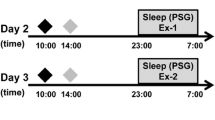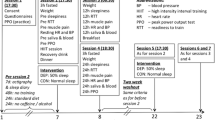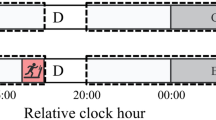Summary
The effects of 64 h of sleep deprivation upon cardiorespiratory function was studied in 11 young men (\(\dot V_{{\text{O}}_{{\text{ 2 max}}} } = 55.5{\text{ ml kg}}^{ - 1} {\text{ min}}^{ - 1} ,{\text{ STPD}}\)). Six subjects engaged in normal sedentary activities, while the others walked on a treadmill at 28%\(\dot V_{{\text{O}}_{{\text{ 2 max}}} } \) for one hour in every three; eight weeks later, sleep deprivation was repeated with a crossover of subjects. Immediate post-deprivation measurement of\(\dot V_{{\text{O}}_{{\text{ 2 max}}} } \) showed a small but statistically significant decrease (−3.8 ml min−1 kg−1, STPD), with no difference between exercise and control trials. The final decrement in aerobic power was not due to a loss of motivation, as 88% (21 of 24) of post-deprivation tests still showed a plateau of\(\dot V_{{\text{O}}_{{\text{ 2 max}}} } \); in addition, terminal heart rates (198 vs 195 beats min−1), respiratory exchange ratios (1.14 vs 1.15) and blood lactate levels (12.1 vs 11.8 mmol l−1) were not significantly different after sleep deprivation. The decrease in\(\dot V_{{\text{O}}_{{\text{ 2 max}}} } \) was associated with a lower\(\dot V_{{\text{E}}_{{\text{ 2 max}}} } \) (127 vs 142 l min−1, BTPS) and a substantial haemodilution (13%). Physiological responses to sub-maximal exercise showed persistence of the normal diurnal rhythm in heart rate and oxygen consumption, with no added effects due to sleep deprivation. However, ratings of perceived exertion (Borg scale) increased significantly throughout sleep deprivation. The findings are consistent with a mild respiratory acidosis, secondary to reduced cortical arousal and/or a progressive depletion of tissue glycogen stores which are not altered appreciably by moderate physical activity.
Similar content being viewed by others
References
Ayers AB, Davies BN, Withrington PG (1972) Responses of the isolated, perfused human spleen to sympathetic nerve stimulation, catecholamines and polypeptides. Br J Pharmacol 44:17–23
Borg G (1971) The perception of physical performance. In: Shephard RJ (ed) Frontiers of fitness. C. C. Thomas, Springfield, Ill
Brodan V, Kuhn E (1967) Physical performance in man during sleep deprivation. J Sports Med Phys Fitness 7:28–30
Brodan V, Vojtechovsky M, Kuhn E, Cepelak J (1969) Changes of mental and physical performance in sleep deprivated healthy volunteers. Act Nerv Super 11:175–181
Buckbe RM (1965) Exertional (March) hemoglobinuria. Reduction of hemolytic episodes by use of Sorbo-Rubber insoles in shoes. Lancet 1:1136–1138
Cooper KR, Phillips BA (1982) Effect of short-term sleep loss on breathing. J Appl Physiol: Resp Environ Exercise Physiol 53:855–858
Copes K, Rosentswieg J (1972) The effects of sleep deprivation upon motor performance of ninth grade students. J Sports Med Phys Fitness 12:47–53
Dill DB, Costill DL (1974) Calculation of percentage changes in volumes of blood, plasma and red cells in dehydration. J Appl Physiol 37:247–248
Fiorica V, Higgins EA, Iampietro PF, Lategola MT, Davis AW (1968) Physiological responses of men during sleep deprivation. J Appl Physiol 24:167–176
Horne JA, Pettitt AN (1984) Sleep deprivation and the physiological response to exercise under steady-state conditions in untrained subjects. Sleep 7:168–179
Jones NL, Campbell EJM, Edwards RHT, Robertson DG (1975) Clinical exercise testing. W. B. Saunders Co, Philadelphia
Jones NL, Campbell EJM, Edwards RHT, Wilkoff G (1969) Alveolar to blood PCO2 difference during rebreathing in exercise. J Appl Physiol 27:356–360
Jones NL, Robertson D, Kane JW (1979) Difference between end-tidal and arterial PCO2 in exercise. J Appl Physiol: Respirat Environ Exercise Physiol 47:954–960
Kant GJ, Genser SG, Thorne DR, Pfalser JL, Mougey EH (1984) Effects of 72 hour sleep deprivation on urinary cortisol and indices of metabolism. Sleep 7:142–146
Kiiskinen A, Komppinen L, Hasen J (1975) Is the anemia following repeated sessions of heavy physical exercise caused by decreased rate of production of red cells? In: Howald H, Poortmans JR (eds) Metabolic Adaptation to Prolonged Exercise. Birkhäuser Verlag, Basel
Martin BJ (1981) Effect of sleep deprivation on tolerance of prolonged exercise. Eur J Appl Physiol 47:345–354
Martin BJ, Chen HI (1984) Sleep loss and the sympathoadrenal response to exercise. Med Sci Sports Exerc 16:56–59
Martin BJ, Gaddis GM (1981) Exercise after sleep deprivation. Med Sci Sports 13:220–224
Mills JN (1973) Biological aspects of circadian rhythms. Plenum Press, London
Myles WS (1985) Sleep deprivation, physical fatigue and the perception of exercise intensity. Med Sci Sports Exerc 17:580–584
Pickett GF, Morris AF (1975) Effects of acute sleep deprivation on total body response time and cardiovascular performance. J Sports Med Phys Fitness 15:49–56
Schiffman PL, Troutell MC, Mazar MF, Edelman NH (1983) Sleep deprivation decreases ventilatory response to CO2 but not load compensation. Chest 84:694–698
Shephard RJ (1966) Oxygen cost of breathing during vigorous exercise. Quart J Exp Physiol 51:336–350
Shephard RJ (1977) Endurance fitness. University of Toronto Press, 2nd Ed., Toronto
Shephard RJ (1984) Sleep, biorhythms and human performance. Sports Med 1:11–37
Summers SP (1964) The effect of partial sleep loss on motor and cardiovascular fitness. M. Sc. Thesis, University of Illinois
Vondra K, Brodan B, Bass A, Kuhn E, Teisinger J, Andel M, Beselkova A (1981) Effects of sleep deprivation on the activity of selected metabolic enzymes in skeletal muscle. Eur J Appl Physiol 47:41–46
Weiner JS, Lourie JA (1969) Human biology: a guide to field methods. Blackwell, Oxford
Wojtczak-Jaroszowa J, Banaszkiewicz A (1974) Physical work capacity during the day and at night. Ergonomics 17:193–198
Author information
Authors and Affiliations
Rights and permissions
About this article
Cite this article
Plyley, M.J., Shephard, R.J., Davis, G.M. et al. Sleep deprivation and cardiorespiratory function. Europ. J. Appl. Physiol. 56, 338–344 (1987). https://doi.org/10.1007/BF00690902
Accepted:
Issue Date:
DOI: https://doi.org/10.1007/BF00690902




